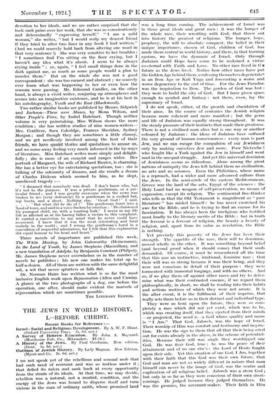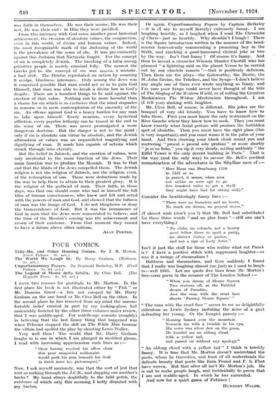THE JEWS IN WORLD HISTORY. I.—BEFORE CHRIST.
Recent Books for Reference :- Israel : Social and Religious Development. By A. W. F. Blunt. (Oxford University Press. 2s. 6d. net.) A Survey of Hebrew Education. By John A. Maynard. (Morehosise Pub. Co., Milwaukee. $1.EO.)
A History of the Jews. By Paul Goodman. New edition. (Dent. is. 9d. net.) Outlines of Jewish History. By Lady Magnus. New Edition. (Myers and Co. 2s. 6d. net.)
I no not speak yet of the rebellious and sensual .mob that had such need of restraint and was so restless under it ; that defied its rulers and sank back at every opportunity from the strain of its ideals. At that time, we may decide, rebellion was a natural, not a morbid, condition, and the energy of the Jews was bound to disperse itself and turn vicious in the man of ordinary earth, whose promised land was a long time coming. The .achievement of Israel was in those great ideals and great men : it was the hunger of the whole race, their wrestling with God, that threw out into history the greatest of religions. The hunger, hope, prophecy, the will to absolute conquest, the belief in their unique importance, chosen of God, children of God, has made them central in world history, and there, in that burning egoism, we have the dynamic of Israel. Only through Judaism could Hope have come to be reckoned a virtue co-eternal with Faith and Love. No other race lived in tl future as the Jews lived. Notice how other races have put the Golden Age behind them, confessing themselves degenerates in an Iron Age or Kali Yuga and forecasting a worse and worse degeneracy to the end of time. For the Jews Paradise was the inspiration to Zion. The garden of God was lost : they were to build the city of God. But I have given space enough to symbol and fantasy : not there, even, lay the supremacy of Israel.
I do not speak, either, of the growth and elucidation of their aims. In the course of centuries the Jewish religion becamo• more coherent and more manifest ; but the germ and life of Judaism was equally strong throughout. It was the steady pressure of their instincts that made their greatness. There is not a civilized man alive but is one way or another coloured by Judaism : the ideas of Judaism have suffused the very ground of human consciousness : every man is part Jew, and we can escape the compulsion of our Jewishness only by making ourselves Jew and more. Poor Nietzsche ! who fought like a Turk against the Jew in himself and went mad in the unequal struggle. And yet this universal dominion of Jewishness seems so ridiculous. Alone among the great nations of antiquity the Jews left behind them no civilization, no arts and no sciences. Even the Philistines, whose name is a reproach, had a wider and more advanced culture than the Jews. In the semi-circle of the eastern Mediterranean, Greece was the land of the arts, Egypt of the sciences : the Holy Land had no weapon of self-preservation, no means of expression, except its religion. The sentimental free-thinker who tells us that the Old Testament is magnificent as " pure literature " has misled himself : he has never exorcized his awe for the Bible, and he is trying to find an excuse for its fascination. It has always been the irreligious who testified most loudly to the literary merits of the Bible ; but in truth the fervour is a fervour of religion, the beauty a beauty of religion, and, apart from its value as revelation, the Bible is nothing.
Yet precisely this poverty of the Jews has been their strength. The appetite of the race, their will to dominion, moved wholly in the ether. It was something beyond belief (and beyond proof when it should come) that their souls demanded. Of course, it must be remembered all the time that this was an instinctive, irrational, feminine race ; that their will was so strong because it was their being, and they were not conscious in detail of their purpose : they were tormented with immortal longings, and with no others. And so, if we play them off against other races and try to deter- mine what was their contrasted essence, if we regard them philosophically, in short, we shall be reading into their habits and actions motives of which they were not aware. It is the after event, it is the fulfilment of their impetus, that really sets them before us in their distinct and individual type.
They were so bent upon the future, they were so com- pletely a race which did not yet exist, which was to be, which was creating itself, that they ejected from their minds —or projected, the word is—a God whose quality and name is " I Am." That God, Jahweli, was the hope of Israel.
Their worship of Him was comfort and testimony and inspira- tion. He was the sign to them that all that their being cried out for exists already in the abyss, in the scheme of potential- ities. Because their will was single they worshipped one
God. He was their God, true ; he was the peace of their attainment and of no one else's : the Lord of Hosts fought upon their side. Yet this creation of one God, I Am, together
with their faith that this God was their own future, that God and man are not so widely different in nature that man himself can never be the image of God, was the centre and explication of all religious belief. Jahweh was a stern God ; but only in so far as they were conscious of their own short- comings. He judged because they judged themselves. He was the promise, the covenant-maker. Their faith in Him was faith in themselves. He was their source, He was their rest, He was their end : in Him they were justified.
From this intimacy with God came another great historical achievement, the creation of absolute values, the conjunction, even in this world, of divine and human values. Indeed, the most recognizable mark of the Judaizing of the world is the prevalence of the sense of sin. It was pre-eminently against this Judaism that Nietzsche fought. For the concept of sin is completely Jewish. The breaking of a tabu among primitive people is merely criminal folly. The nearest the Greeks got to the concept of sin was 1.papria, a mistake, a bad shot. The Hindus reprobated an action by counting it avidya, blindness, ignorance. Only among the Jews was it conceived possible that man could act so as to pain God Himself, that man was able to break a divine law in God's despite. There are a hundred things to be said against the erection of that value. Nothing can be more harmful than a shame for sin which is so exclusive that the mind stagnates in remorse or in mere contemplation of the enormity of the sin. An offence against God is a heavy burden for any man to take upon himself. Every neurosis, every hysterical affliction, every psychic lethargy can be traced in the end to the sense of sin. There was never promulgated a more dangerous doctrine. But the danger is not to the point : only if sin is absolute can virtue be absolute, and the Jewish affirmation of values was an unparalleled magnifying and dignifying of man. It made him capable of actions which struck through into eternity.
But the belief in Jahweh, and the creation of values, were only incidental to the main function of the Jews. Their main function was to produce the Messiah. It was to that end that the libido of the Jews compelled them. The Jewish religion is not the religion of Jahweh, nor the religion, even, of the redemption of sins. Those were deductions made by the way to help them to attain to their greatest glory. It is the religion of the godhead of man. Their faith, in those days, was that one should come who had in himself the full bliss of human consciousness, who knew and felt and acted with the powers of man and God, and showed that the fullness of man was the image of God. I do not blaspheme or deny the transcendence of God. But it was the immanence of God in man that the Jews were consecrated to believe, and the time of the Messiah's coming was the achievement and crown of their existence. From that moment they ceased to have a future above other nations.
ALAN PORTER.











































 Previous page
Previous page